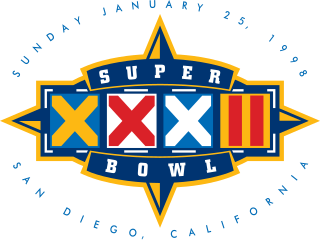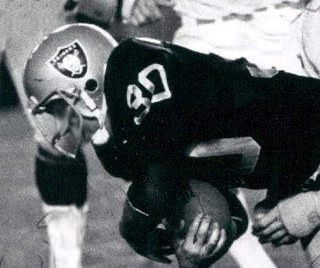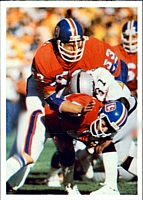Super Bowl XI was an American football game between the American Football Conference (AFC) champion Oakland Raiders and the National Football Conference (NFC) champion Minnesota Vikings to decide the National Football League (NFL) champion for its 1976 season. The Raiders defeated the Vikings by the score of 32–14 to win their first Super Bowl. The game was played on January 9, 1977, at the Rose Bowl in Pasadena, California. This remains the earliest scheduled calendar date for a Super Bowl; and the most recent Super Bowl to begin before 4:00 p.m. ET.

Super Bowl XII was an American football game between the National Football Conference (NFC) champion Dallas Cowboys and the American Football Conference (AFC) champion Denver Broncos to decide the National Football League (NFL) champion for the 1977 season. The Cowboys defeated the Broncos 27–10 to win their second Super Bowl. The game was played on January 15, 1978, at the Louisiana Superdome in New Orleans. This was the first Super Bowl in a domed stadium, and the first time that the game was played in prime time in the Eastern United States.

Super Bowl XXII was an American football game between the National Football Conference (NFC) champion Washington Redskins and American Football Conference (AFC) champion Denver Broncos to decide the National Football League (NFL) champion for the 1987 season. The Redskins defeated the Broncos by the score of 42–10, winning their second Super Bowl. The game was played on January 31, 1988, at Jack Murphy Stadium in San Diego, California, which was the first time that the Super Bowl was played there. It was the second consecutive Super Bowl loss for the Broncos, who had lost to the New York Giants in the Super Bowl the year before.

Super Bowl XXIV was an American football game between the National Football Conference (NFC) champion San Francisco 49ers and the American Football Conference (AFC) champion Denver Broncos to decide the National Football League (NFL) champion for the 1989 season. The game was played on January 28, 1990, at the Louisiana Superdome in New Orleans, Louisiana. The 49ers defeated the Broncos by the score of 55–10, winning their second consecutive Super Bowl, and their fourth overall, tying the Pittsburgh Steelers for the most Super Bowl wins at that time. San Francisco also became the first team to win back-to-back Super Bowls with two different head coaches; rookie head coach George Seifert took over after Bill Walsh retired following the previous season's Super Bowl.

Super Bowl XXXII was an American football game played between the National Football Conference (NFC) champion and defending Super Bowl XXXI champion Green Bay Packers and the American Football Conference (AFC) champion Denver Broncos to decide the National Football League (NFL) champion for the 1997 season. The Broncos defeated the Packers by the score of 31–24. The game was played on January 25, 1998, at Qualcomm Stadium in San Diego, California, the second time that the Super Bowl was held in that city. Super Bowl XXXII also made Qualcomm Stadium the only stadium in history to host both the Super Bowl and the World Series in the same year.

Super Bowl XXXIII was an American football game played between the American Football Conference (AFC) champion and defending Super Bowl XXXII champion Denver Broncos and the National Football Conference (NFC) champion Atlanta Falcons to decide the National Football League (NFL) champion for the 1998 season. The Broncos defeated the Falcons by the score of 34–19, winning their second consecutive Super Bowl. The game was played on January 31, 1999, at Pro Player Stadium in Miami, Florida.
David John Casper nicknamed "the Ghost", is an American former professional football player who was a tight end in the National Football League (NFL), primarily with the Oakland Raiders. Casper has been inducted into both the College Football Hall of Fame (2012) and the Pro Football Hall of Fame (2002).

The National Football League playoffs for the 1977 season began on December 24, 1977. The postseason tournament concluded with the Dallas Cowboys defeating the Denver Broncos in Super Bowl XII, 27–10, on January 15, 1978, at the Louisiana Superdome in New Orleans, Louisiana.
The 1997 season was the Denver Broncos' 28th season in the National Football League (NFL) and their 38th overall. The Broncos finished the season with a record of 12–4, finishing second in the AFC West, and winning Super Bowl XXXII. The Broncos were the second wild card team since the 1970 merger to win a Super Bowl, joining the 1980 Oakland Raiders.
Darrien Jamal Gordon is an American former professional football player who was a cornerback for 10 seasons in the National Football League (NFL) (1993–2002). He was selected by the San Diego Chargers in the first round of the 1993 NFL draft. During his NFL career, he played for five teams, appearing in four Super Bowls. Before his NFL career, Gordon played college football for the Stanford Cardinal, intercepting nine passes in three seasons. Since the NFL Scouting Combine began in 1985, he is one of three players who have been drafted in the first round after not being invited to the combine.
The 2005 season was the Denver Broncos' 36th in the National Football League (NFL) and their 46th overall. The Broncos closed out the 2005 regular season with a 13–3 record, the franchise's second-best number of wins of all time and their third best win percentage ever. They won their first playoff game since their 1998 Super Bowl-winning season. Although they eliminated the defending back-to-back Super Bowl champion New England Patriots to end their hopes of becoming the first NFL team to three-peat, and became the first team to eliminate a defending back-to-back Super Bowl champion in the playoffs since the 1994 San Francisco 49ers, they failed to get to the Super Bowl, losing to the Pittsburgh Steelers, the eventual champions, in the AFC Championship game. The Broncos were expected by many to make the Super Bowl for the first time in the post-John Elway era. Denver would not make the postseason again until 2011 under Tim Tebow's leadership or another Conference championship until 2013, under the leadership of Peyton Manning whom the Broncos acquired in 2012.

Mark van Eeghen is an American former professional football player who was a running back for ten years in the National Football League (NFL), during which he made two Super Bowl appearances. He played eight seasons for the Oakland Raiders (1974–1981) then two years with the New England Patriots (1982–1983). Van Eeghen rushed for over 1,000 yards in three consecutive seasons from 1976 to 1978.
Hewritt Frederick Dixon Jr. was an American professional football halfback who played for seven seasons in the American Football League (AFL) and National Football League (NFL). He played for the Denver Broncos and the Oakland Raiders.
The 1974 Pittsburgh Steelers season was the franchise's 42nd in the National Football League (NFL). They improved to a 10–3–1 regular-season record, won the AFC Central division title, sending them to the playoffs for the third consecutive season, and won a Super Bowl championship, the first league title in Steelers' history. This was the first of six consecutive AFC Central division titles for the Steelers, and the first of four Super Bowl championships in the same time period.
The 1990 Los Angeles Raiders season was the franchise's 31st season overall, and the franchise's 21st season in the National Football League. Led by Coach of the Year Art Shell, the club appeared in its first AFC Championship Game since their Super Bowl-winning 1983 season, but lost a lopsided affair to the Buffalo Bills, 3–51. This would be the Raiders' final division title for 10 years, and their final one in Los Angeles. Bo Jackson suffered a hip injury in the team's divisional playoff victory against the Cincinnati Bengals which turned out to be a career ending injury for him.
The 1977 Denver Broncos season was the team's 18th year in professional football and its eighth with the National Football League (NFL).

The 1989 Denver Broncos season was the team's 30th year in professional football and its 20th with the National Football League (NFL). The head coach was Dan Reeves while Chan Gailey was the offensive coordinator and Wade Phillips was the defensive coordinator. In the postseason Denver won a nail biter over the Pittsburgh Steelers 24–23 then cruised over the Cleveland Browns 37–21 in the AFC Championship Game.
The 1979 Denver Broncos season was the team's 20th year in professional football and its 10th with the National Football League (NFL). Led by third-year head coach Red Miller, the Broncos were 10–6, second in the AFC West, and made the postseason a third consecutive year. In the Wild Card round the Broncos lost to the Houston Oilers 13–7.
The 1978 Oakland Raiders season was the team's 19th season, and ninth as an NFL member.

Brock Alan Osweiler is an American former professional football quarterback who played in the National Football League (NFL) for seven seasons. He played college football for the Arizona State Sun Devils and was selected by the Denver Broncos in the second round of the 2012 NFL draft. Osweiler first served as the Broncos' starter during their Super Bowl-winning season in 2015 when he relieved an injured Peyton Manning and helped Denver get the top seed in the AFC heading into the postseason, although Manning resumed his starting duties for the playoffs and eventual Super Bowl 50 victory.









